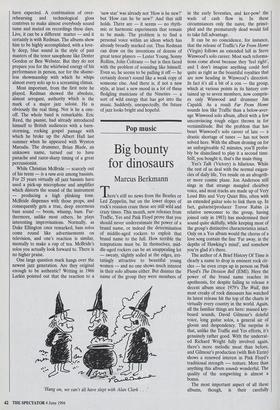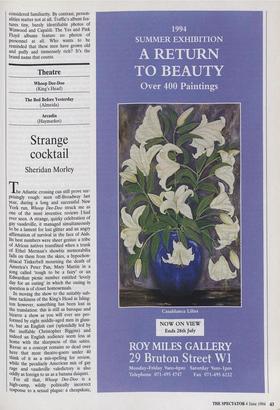Pop music
Big bounty for dinosaurs
Marcus Berkmann
T
here's still no news from the Beatles or Led Zeppelin, but on the lower slopes of rock's reunion craze these are still wild and crazy times. This month, new releases from Traffic, Yes and Pink Floyd prove that you should never underestimate the power of a brand name, or indeed the determination of middle-aged rockers to exploit that brand name to the full. How terrible the temptations must be. In themselves, mid- dle-aged rockers can be an unappealing lot — sweaty, slightly soiled at the edges, irri- tatingly attractive to beautiful young women — and no one shows much interest in their solo albums either. But disinter the name of the group they were members of `Hang on, we can't all have slept with Alan Clark . . in the early Seventies, and ker-pow! the wads of cash flow in. In these circumstances only the naive, the princi- pled and the prematurely dead would fail to take full advantage.
It can be no coincidence, for instance, that the release of Traffic's Far From Home (Virgin) follows an extended lull in Steve Winwood's solo career. Most such reforma- tions come about because they 'feel right', and I don't imagine anything could feel quite as right as the bountiful royalties that are now heading in Winwood's direction. In fact it's all a bit of a con — the group, which at various points in its history con- tained up to seven members, now compris- es only Winwood and drummer Jim Capaldi. As a result Far From Home sounds less like Traffic than a below-aver- age Winwood solo album, albeit with a few unconvincing rough edges thrown in for verisimilitude. But the problem that has beset Winwood's solo career of late — a drastic shortage of tunes — has not been solved here. With the album droning on for an unforgiveable 62 minutes, you'll proba- bly be disinclined to play it a second time. Still, you bought it, that's the main thing Yes's Talk (Victory) is hilarious. While the rest of us deal with the normal exigen- cies of daily life, Yes reside on an altogeth- er more cosmic plane. Jon Anderson still sings in that strange mangled choirboy voice, and most tracks are made up of Very Loud Bits and Very Quiet Bits, often with an extended guitar solo to link them up. In fact, guitarist/producer Trevor Rabin (a relative newcomer to the group, having joined only in 1983) has modernised their sound quite skilfully, while keeping most of the group's distinctive characteristics intact. Only on a Yes album would the chorus of a love song contain the line 'Far away, in the depths of Hawking's mind', and somehow you're glad it's there.
The author of A Brief History Of Time is clearly a name to drop in eminent rock cir- cles — he even crops up in person on Pink Floyd's The Division Bell (EMI). Here the power of the brand name reaches its apotheosis, for despite failing to release a decent album since 1979's The Wall, this most creaky of rock dinosaurs has watched its latest release hit the top of the charts in virtually every country in the world. Again, all the familiar things are here: massed key- board sounds, David Gilmour's doleful voice, long guitar solos, a general air of gloom and despondency. The surprise is that, unlike the Traffic and Yes efforts, it's genuinely rather good. With the underrat- ed Richard Wright fully involved again, there's more melodic meat than before, and Gilmour's production (with Bob Ezrin) shows a renewed interest in Pink Floyd's traditional strength — texture. More than anything this album sounds wonderful. The quality of the songwriting is almost a bonus.
The most important aspect of all these albums, though, is their carefully considered familiarity. By contrast, person- alities matter not at all. Traffic's album fea- tures tiny, barely identifiable photos of Winwood and Capaldi. The Yes and Pink Floyd albums feature no photos of personnel at ail. Who wants to be reminded that these men have grown old and puffy and immensely rich? It's the brand name that counts.



























































 Previous page
Previous page